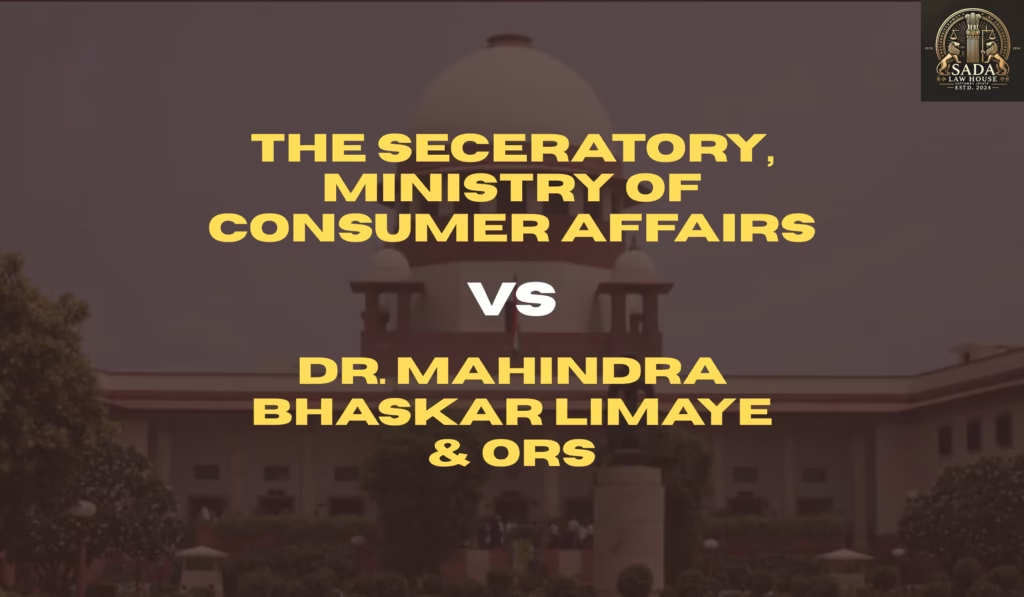Supreme Court Upholds High Court Verdict: Valid Selection Cannot Be Undone by New Tribunal Rules
Trending Today Supreme Court Upholds High Court Verdict: Valid Selection Cannot Be Undone by New Tribunal Rules Supreme Court Rules ONGC’s Prolonged Land Occupation Unconstitutional Under Article 300A LEGAL JOB OPPORTUNITY AT LAW CHAMBERS OF ROHIT BHARADWAJ LEGAL JOB OPPORTUNITY AT LAW COMMISSION OF INDIA, DELHI JOB OPPORTUNITY AT QUANTUM LEGAL LEGAL JOB OPPORTUNITY AT BAJAJ, HYDERABAD JOB OPPORTUNITY AT DR. B.R. AMBEDKAR NATIONAL LAW UNIVERSITY, SONEPAT LEGAL JOB OPPORTUNITY AT AMS LEGAL, CHENNAI LEGAL INTERNSHIP OPPORTUNITY AT HER VOICE LAW LEGAL JOB OPPORTUNITY AT LEXCLAIM Supreme Court Upholds High Court Verdict: Valid Selection Cannot Be Undone by New Tribunal Rules REHA BHARGAV 19 June 2025 The Supreme Court rules that selected candidates for Consumer Commissions cannot be denied appointments under the retrospective application of the Tribunal Reforms Act, 2021—reinforcing judicial independence and fair selection processes. Introduction In a landmark ruling, the Supreme Court of India upheld the rights of legally selected candidates for Consumer Commissions, ruling against the retrospective application of the Tribunal Reforms Act, 2021. The case—The Secretary, Ministry of Consumer Affairs v. Dr. Mahindra Bhaskar Limaye & Others—highlights critical issues surrounding judicial appointments, administrative law, and the separation of powers. Background: Understanding the Case Who Were the Parties Involved? Petitioner: The Secretary, Ministry of Consumer Affairs (Union of India) Respondents: Dr. Mahindra Bhaskar Limaye and other selected candidates for consumer commission positions What Sparked the Dispute? The respondents had been lawfully selected as Presidents and Members of District and State Consumer Disputes Redressal Commissions in Maharashtra. Their selection occurred under the existing rules before the Tribunal Reforms Act, 2021 and its accompanying Tribunals Reforms (Conditions of Service) Rules, 2021 came into force. These new rules: Imposed a fixed four-year tenure Introduced new eligibility criteria Were applied retrospectively by the government to deny the appointments Key Legal Issues Raised Can Retrospective Rules Override Completed Selection Processes? The core legal question was whether the government could refuse appointments to candidates selected under the old legal framework by applying new rules retrospectively. Do the New Rules Violate Constitutional Principles? The Court examined whether the Tribunal Reforms Act, 2021 and its Rules: Violated Article 14 (Right to Equality) Violated Article 21 (Right to Fair Procedure) Undermined judicial independence and previously established legal precedents Arguments Presented Union of India’s Standpoint Asserted the Tribunal Reforms Act brought uniformity and transparency Claimed no vested right to appointment existed without formal letters Argued the High Court overstepped its jurisdiction by mandating appointments Respondents’ Counterpoints Selection was done lawfully under existing rules Retrospective denial was arbitrary and unjust Emphasized legitimate expectation and fairness in the process Argued the new rules could not nullify completed selections Supreme Court Judgment The Supreme Court dismissed the appeal filed by the Union of India, affirming the Bombay High Court‘s decision. Key takeaways include: The selection process was valid under the previous legal framework Retrospective application of new eligibility criteria was unconstitutional Denial of appointment violated Articles 14 and 21 of the Constitution Executive discretion cannot override the rule of law The State was directed to issue appointment letters Impact and Significance Strengthening Judicial Independence This judgment reinforces that governments must honor completed selection processes and cannot arbitrarily apply new legislative rules to undo them. It underscores the importance of: Separation of powers Judicial independence Administrative fairness What This Means for Future Tribunal Appointments Legal practitioners with 10 years of experience are now assured of fair consideration under stable legal standards. The ruling sets a significant precedent against retrospective denial of rights in quasi-judicial appointments. Conclusion The Supreme Court’s verdict in The Secretary, Ministry of Consumer Affairs v. Dr. Mahindra Bhaskar Limaye is a decisive step in safeguarding constitutional values, judicial integrity, and due process in tribunal appointments. It sends a strong message: once a selection is validly made, it must be honored—regardless of future rule changes. Leave a Reply Cancel Reply Logged in as Sada Law. Edit your profile. Log out? Required fields are marked * Message* Case Laws Supreme Court Upholds High Court Verdict: Valid Selection Cannot Be Undone by New Tribunal Rules Sada Law • June 19, 2025 • Case law • No Comments Supreme Court Rules ONGC’s Prolonged Land Occupation Unconstitutional Under Article 300A Sada Law • June 19, 2025 • Case law • No Comments Supreme Court Judgment on Union of India vs Union Carbide Corporation (2023) | Bhopal Gas Tragedy Settlement & Legal Finality Sada Law • June 18, 2025 • Case law • No Comments 1 2 3 … 5 Next »


